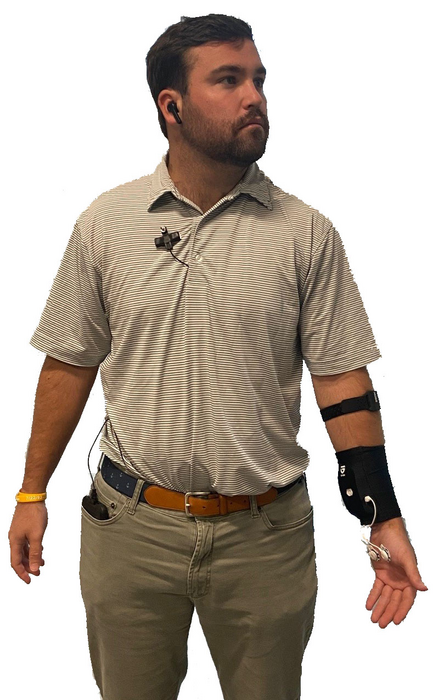Sights, smells and sounds of everyday life can supply the triggers that take someone with PTSD right back to the scarring scene they’re trying to forget.

Credit: Zeriscope
Sights, smells and sounds of everyday life can supply the triggers that take someone with PTSD right back to the scarring scene they’re trying to forget.
With PTSD, or post-traumatic stress disorder, a honking horn, a crowded coffeehouse or a sharp scent can bring back traumatic memories that can raise the heart rate, increase muscle tension and lead to anxiety and depression. These reactions occur even without the presence of danger, but they pose their own threat by causing strains on relationships at home and work, igniting the need to avoid certain situations and contributing to mood changes.
PTSD can happen to anyone at any age, according to the National Institutes of Health, and treatment options include medications as well as therapy. Researchers at MUSC Health recently published a paper in the Journal of Psychiatric Research where they worked with medical device company Zeriscope to test a device called Bio Ware, which is designed to enhance the effects of prolonged exposure therapy, a common, evidence-based therapy for patients with PTSD.
And with between 11 and 30% of veterans experiencing symptoms of PTSD, the research team looked at using Bio Ware with service members at the Ralph H. Johnson VA Medical Center specifically.
With in vivo exposures, which are a key component of prolonged exposure therapy, patients are tasked with putting themselves in safe but uncomfortable or triggering situations outside of their therapy sessions, as a form of homework. If they have a fear of crowded spaces, for example, their therapist may ask them to go to the grocery store at a busy time and then share their reaction at the next therapy session. If the service member is stressed by loud spaces and avoids them, their therapist may send them to a loud sporting event, for example, in an effort to help them learn to feel more comfortable in those situations and not have to avoid them in the future.
When done properly, in vivo exposures have proven successful and helpful to patients, but with so much relying on the patient and their interpretation of their own stressors, Sudie Back, Ph.D., a professor in the department of psychiatry at MUSC Health and principal investigator for the NIMH-funded study, sees room for error.
“What I find so exciting about this new Bio Ware device,” she said. “Is that when used alongside evidence-based, exposure treatment methods for PTSD, we’ve seen significantly better results for our patients.” Back and her team saw significant decreases in both PTSD symptoms and depression symptoms with their patients who used the new technology.
As a wearable device, the Bio Ware system includes a discreet button-shaped camera attached to the patient’s clothing, a watch-sized tool around their wrist and a Bluetooth headphone in their ear so their therapists can be virtually with them in the experience or situation that causes them stress. The clinician can see immediate recordings of the patient’s heart rate, breathing and emotional distress, and they can guide them through the experience by either pushing them to do more or pulling them back to do less, to optimize the in vivo exposure.
According to Back, “This is the first time, to my knowledge, that we’ve been able to virtually go with patients during their in vivo exposures and have instant access to their physiological data in the moment to really help them get the most out of those exercises, which I believe will translate into them seeing significant reductions in their PTSD symptoms.”
Bill Harley, the co-founder and CEO of Zeriscope, compares it to working out on your own versus with a personal trainer.
“Communicating with patients while simultaneously seeing their biophysics is incredibly helpful,” he said. “A lot of healing happens in the in vivo exposures, and Bio Ware enriches that experience.”
The “special sauce” created with Bio Ware lies in the autonomic nervous system according to Robert Adams, M.D., the president and co-founder of Zeriscope and a professor of neurology at MUSC Health. Previously developed watches aimed for something similar, but they only collected pulse information. This system goes a level deeper, he says, by directly questioning the autonomic nervous system.
The autonomic nervous system controls physiologic reactions like heart rate, blood pressure and breathing. By using the same technology used in lie detector tests, physicians can take this galvanic skin response, change the patient’s triggering experience accordingly and watch how the actions that they direct the patient to do impact the autonomic nervous system.
One of these days, they know they gotta get goin’,
Out of the door and down the street all alone.
Adams thinks the line from the Grateful Dead song “Truckin’” summarizes the need for Bio Ware. “It’s an expression of what exposure therapy really is. You’ve got to go back out into the real world on your own, but we can help.”
###
About MUSC
Founded in 1824 in Charleston, MUSC is the state’s only comprehensive academic health system, with a unique mission to preserve and optimize human life in South Carolina through education, research and patient care. Each year, MUSC educates more than 3,000 students in six colleges – Dental Medicine, Graduate Studies, Health Professions, Medicine, Nursing and Pharmacy – and trains more than 850 residents and fellows in its health system. MUSC brought in more than $327.6 million in research funds in fiscal year 2021, leading the state overall in research funding. MUSC also leads the state in federal and National Institutes of Health funding, with more than $220 million. For information on academic programs, visit musc.edu.
DOI
10.1016/j.jpsychires.2022.10.056
Article Title
Technology-enhanced in vivo exposures in Prolonged Exposure for PTSD: A pilot randomized controlled trial
Article Publication Date
1-Nov-2022




